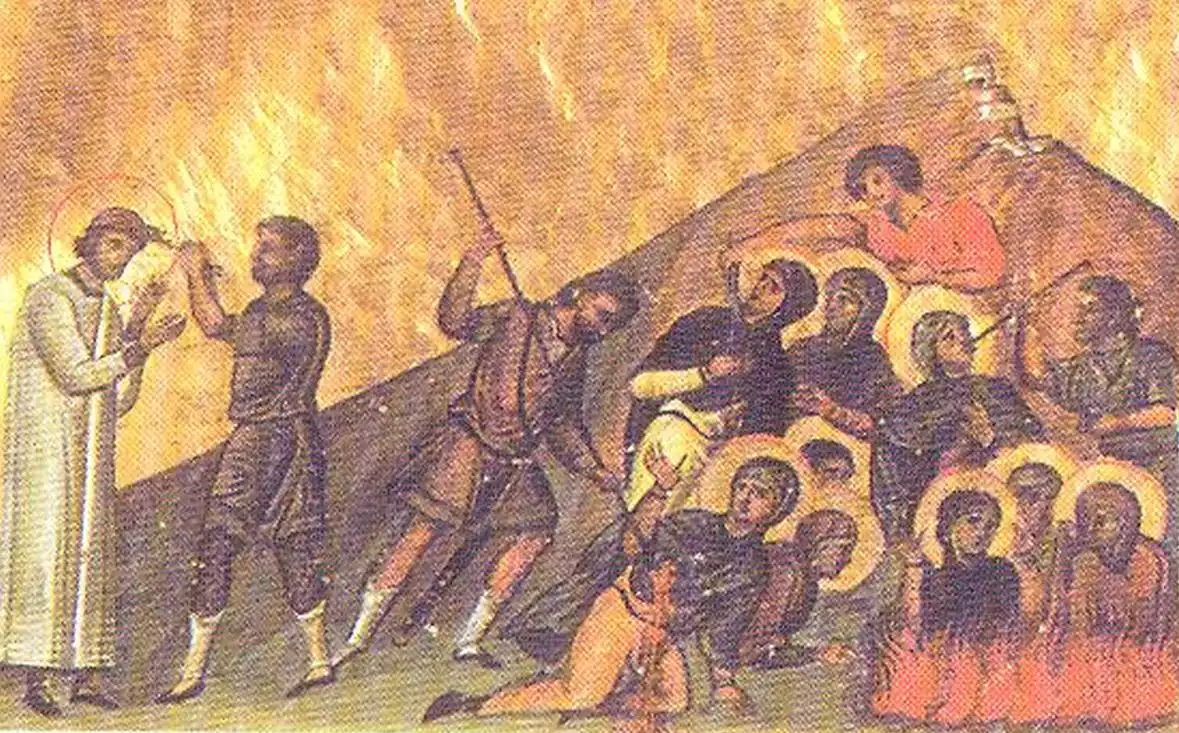
In the tumultuous era of 305 AD, amidst the reign of Emperor Licinius, a tale of extraordinary faith and indomitable spirit unfolded in Adrianople, Thrace. It was here that 40 ascetic virgins, under the guidance of Deacon Ammun, embraced a journey of devout resistance and ultimate sacrifice. This poignant narrative not only marks a pivotal moment in Christian history but also celebrates the unwavering devotion of these young martyrs. Their story, commemorated annually on September 1st, remains a beacon of inspiration, symbolizing the triumph of spiritual conviction over worldly oppression.
Trials of Faith and the Final Stand
The journey of these 40 holy martyrs, named Adamantini, Calliroi, Chariclea, Penelope, Cleo, Thalia, Marianthi, Euterpe, Terpsichore, Ourania, Cleonike, Sappho, Erato, Polymnia, Dodoni, Athena, Troas, Cleopatra, Coralia, Callisti, Theonoe, Theano, Aspasia, Polynice, Dione, Theophanes, Erasmia, Hermenia, Aphrodite, Margarita, Antigone, Pandora, Haido, Lambro, Moscho, Areboia, Theonymph, Acribe, Melpomene, Elpinike and Ammon their teacher, began in an era marked by intense persecution of Christians. Emperor Licinius, infamous for his tyrannical rule, issued a decree that brought fear and turmoil to the Christian community. Yet, amidst this chaos, these young women stood resolute, guided by their deep spiritual convictions and the teachings of Deacon Ammun. Their radiant inner beauty, unmarred by material temptations, was devoted to higher, celestial aspirations.
Facing the wrath of Licinius, these virgins refused to renounce their faith or bow to idolatry. Their resistance led to a series of brutal tortures, a testament to their unyielding faith. Each, whether through fire, sword, or other horrific means, embraced martyrdom with a steadfastness that defied the cruelty of their oppressors. As they endured these trials, visions of divine presence and the support of Christ Himself fortified their resolve, transforming their ordeal into a transcendent affirmation of faith.
The spirituality of these martyrs was not merely a passive acceptance of fate but a conscious, vibrant choice. In their ascetic lives, they sought spiritual enlightenment, embracing the hardships of their path with complete devotion. This deep spiritual awakening fostered a resilience that withstood the gravest of challenges. Their hearts, purified of worldly desires, were focused singularly on the divine, enabling them to face martyrdom with a fearless grace.
Legacy of Light and Love
The legacy of the 40 holy martyrs transcends time, illuminating the path of faith for future generations. Their martyrdom, an ultimate act of love and self-sacrifice, resonates as a powerful testament to the strength of spiritual conviction. These virgins, in the face of daunting trials, exemplified a profound commitment to their beliefs, a commitment that transformed their earthly suffering into an eternal beacon of hope and resilience.
Their story, a blend of grace and fortitude, continues to inspire a deep sense of devotion and courage in the hearts of believers. It reminds us that true strength lies in unwavering faith and the ability to stand firm in the face of adversity. The memory of these martyrs, celebrated annually, serves as a vivid reminder of the enduring power of faith and the triumph of the human spirit over worldly trials.
The tale of the 40 holy martyrs of Adrianople is not merely a historical account; it is a narrative that echoes the timeless virtues of faith, courage, and perseverance. Their journey, marked by both agony and ecstasy, serves as a guiding light for all who seek spiritual solace and strength. As we remember their sacrifice, let us draw inspiration from their unwavering spirit and continue to carry their legacy forward in our hearts and lives.
Feast Day: September 1
